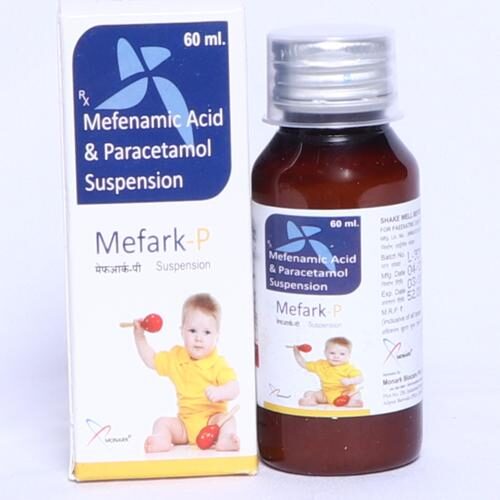Hey there! Welcome to our blog post titled The Benefits of Paracetamol and Mefenamic Acid Suspension: A Comprehensive Guide. If you’ve ever experienced a throbbing headache, painful cramps, or feverish symptoms, chances are you’ve turned to pain relievers to find some relief. Two commonly used medications that come to the rescue in such situations are paracetamol and mefenamic acid suspension. But what exactly are these magical potions, and how do they work? In this guide, we’ll dive deep into the world of paracetamol and mefenamic acid suspension, exploring their benefits, uses, and even a few precautions. So, grab a cup of tea, get comfortable, and let’s embark on this informative journey together!
What is Paracetamol and Mefenamic Acid Suspension?
Paracetamol and Mefenamic Acid Suspension is an essential prescription medication with various uses in the field of pain relief and fever reduction. This combination medication comprises two powerful active ingredients, paracetamol and mefenamic acid, which work together to alleviate pain and reduce fever effectively. The uses of paracetamol and mefenamic acid suspension extend to numerous medical scenarios, including post-operative pain management, menstrual pain relief, and general fever reduction. This medication is often recommended by healthcare professionals for its proven effectiveness in providing prompt and long-lasting relief to patients. With its potent combination of ingredients, paracetamol and mefenamic acid suspension has become a trusted choice for individuals seeking relief from pain and fever-related discomfort.
Paracetamol and mefenamic acid suspension serve various uses in alleviating discomfort and providing relief to individuals. Paracetamol, commonly known as an analgesic and antipyretic medication, effectively tackles pain symptoms such as headaches, muscle aches, toothaches, arthritis, and sore throats. With its ability to target pain receptors, paracetamol offers a reliable solution in relieving these common discomforts. On the other hand, mefenamic acid functions as an anti-inflammatory drug, primarily seeking to diminish inflammation and swelling. Together, the combination of paracetamol and mefenamic acid suspension provides a comprehensive approach to addressing multiple types of pain and inflammation. The uses of paracetamol and mefenamic acid suspension encompass a wide range of ailments, offering individuals a reliable method of finding relief from their discomfort in a convenient and accessible manner.
Paracetamol and Mefenamic Acid Suspension is a highly versatile medication that plays a crucial role in alleviating various types of pain and discomfort. Its primary purpose is to effectively treat mild to moderate pain associated with a range of conditions, including migraine headaches, menstrualcramps, toothache, bone fractures, and other injuries. This suspension is particularly helpful in offering relief to individuals who are experiencing these discomforts. Additionally, it serves as a reliable fever reducer for both adults and children over 6 months of age. Considering the wide array of uses that paracetamol and mefenamic acid suspension provide, it has become an essential medication for those seeking comfort and relief from pain and fever.
All in all, paracetamol and mefenamic acid suspension is a commonly used medication for treating pain and fever. Its safety and effectiveness have been well-established when taken as directed. However, it is important to remember that, like many medications, there can be potential side effects if taken in larger doses or more frequently than recommended by a healthcare professional. These side effects may include nausea, vomiting, drowsiness, or dizziness. Therefore, it is crucial to adhere to the recommended dosage and consult with a healthcare professional about any concerns or questions regarding the uses of paracetamol and mefenamic acid suspension. By doing so, individuals can ensure the safe and appropriate use of this medication for optimal pain relief and fever reduction.
The History of Paracetamol and Mefenamic Acid Suspension
Paracetamol and mefenamic acid suspension, known for their pain-relieving properties, have been trusted remedies since the early 1900s. Initially, these medications were predominantly utilized for reducing fever and alleviating minor aches and pains. However, their versatility and effectiveness have led to a significant expansion in their uses over the years. Today, paracetamol and mefenamic acid suspension are commonly prescribed for a range of conditions that extend beyond the relief of fever and minor discomfort. These medications have proven to be valuable in managing moderate to severe pain associated with menstrual periods, dental procedures, headaches, and musculoskeletal injuries. Their effectiveness in reducing inflammation and providing relief has made them go-to options for various ailments. Moreover, paracetamol and mefenamic acid suspension have also been found effective in alleviating symptoms of certain chronic conditions, such as osteoarthritis and rheumatoid arthritis. With their wide range of applications, these medications have become essential tools in the medical field, providing the much-needed relief and comfort for patients in different circumstances.
Paracetamol and mefenamic acid suspension underwent a significant transformation in the 1950s, resulting in the creation of a potent painkiller that aimed to alleviate severe pain over an extended period. This reformulation enhanced the ability of the drug to provide long-lasting relief, catering to both chronic and acute pain conditions. Today, this advanced formulation has gained immense popularity worldwide for its effectiveness in various types of pain management. The utilization of such a powerful combination has revolutionized the field, allowing individuals to find solace from their agony and resume their daily lives with renewed vigor and comfort.
In recent years, the uses of paracetamol and mefenamic acid suspension have expanded to include the treatment of arthritis and other joint-related conditions. This medication has proven to be effective in providing relief from inflammation, swelling, stiffness, and discomfort experienced by both adults and children. Paracetamol and mefenamic acid suspension offer a valuable solution for individuals suffering from the debilitating effects of arthritis, allowing them to regain their mobility and improve their overall quality of life. With its ability to target the root causes of joint-related discomfort, this medication has become a preferred choice for healthcare professionals and patients alike. Its effectiveness in reducing pain and inflammation is well-documented, making it an essential tool in managing arthritis and improving the well-being of individuals dealing with joint-related conditions. By providing relief and easing symptoms, paracetamol and mefenamic acid suspension significantly contribute to enhancing the quality of life for those affected by these ailments.
However, the uses of paracetamol and mefenamic acid suspension extend far beyond simply relieving menstrual and headache-related pain. These newer studies have shed light on the versatility of this medical tool, revealing its effectiveness in treating a broad range of conditions. From menstrual pain to migraines and tension-type headaches, paracetamol and mefenamic acid suspension have consistently shown positive results. This makes it a valuable option for patients seeking relief from various ailments, offering hope and comfort in the face of discomfort and pain. The availability and effectiveness of these medications provide healthcare professionals with a versatile treatment option that can significantly improve the quality of life for those suffering from different conditions.
Overview of the Uses and Benefits of Paracetamol and Mefenamic Acid Suspension
The uses of paracetamol and mefenamic acid suspension are diverse and effective in treating various types of mild to moderate pain. This combination medication is commonly prescribed to alleviate headaches, toothaches, muscle pain, menstrual cramps, and other common aches and pains. Known for its analgesic properties, paracetamol works by reducing pain signals in the brain and increasing pain threshold. Mefenamic acid, on the other hand, is a nonsteroidal anti-inflammatory drug that helps relieve pain, reduce inflammation, and lower fever. Together, paracetamol and mefenamic acid provide a powerful relief option for individuals experiencing different forms of discomfort. Whether it’s a pesky headache or intense menstrual cramps, this suspension can efficiently alleviate the pain and improve overall well-being. However, it is important to consult a healthcare professional before using this medication to ensure appropriate dosage and to take necessary precautions, especially for individuals with specific medical conditions or taking other medications. By understanding the various uses of paracetamol and mefenamic acid suspension, individuals can find relief from their specific types of pain in a safe and effective manner.
Paracetamol and mefenamic acid suspension is a medication commonly used to alleviate fever in individuals affected by various conditions, such as colds and flu. This combination of medications proves effective in reducing fever by harnessing its anti-inflammatory effect. By targeting and mitigating inflammation linked to fever, the uses of paracetamol and mefenamic acid suspension have proven beneficial for patients seeking relief from elevated body temperatures. This combination medication effectively addresses the symptoms associated with fever, offering individuals a path towards recuperation and improved comfort.
All in all, the use of paracetamol and mefenamic acid suspension presents a myriad of benefits for individuals seeking fast-acting relief from acute pain or discomfort. Not only does this suspension possess the ability to effectively reduce pain and fever, but it also contains a combination of powerful analgesics that work together to provide maximum relief. With its quick-acting properties, individuals can find comfort knowing that this suspension will swiftly alleviate their symptoms. Furthermore, the incorporation of paracetamol and mefenamic acid in this suspension ensures that users can experience a comprehensive approach to addressing pain and discomfort. Whether it be for headaches, menstrual cramps, muscle aches, or any other acute pain, this suspension proves to be a reliable and effective solution. Thus, individuals can confidently rely on the potency and fast-acting relief that paracetamol and mefenamic acid suspension offers in order to alleviate their acute pain and discomfort.
How to Take Paracetamol and Mefenamic Acid Suspension
Paracetamol and mefenamic acid suspension offer a promising solution for those in need of relief from pain and inflammation. These medications have been widely recognized for their effectiveness in combating various health conditions. However, it is crucial to emphasize the importance of adhering to the instructions found on the label or provided by a healthcare professional. This includes strictly following the recommended dosage for each day. By doing so, individuals can ensure they are utilizing the full potential and benefits of these medications for the specific uses of paracetamol and mefenamic acid suspension.
The uses of paracetamol and mefenamic acid suspension are numerous, and understanding how to best utilize these medications is crucial. To mitigate the risk of stomach upset, it is recommended to take them with food or milk. By doing so, individuals can minimize the chances of experiencing any discomfort in the stomach region. Moreover, drinking an ample amount of water while taking this medication is equally important. Water not only aids in preventing dehydration but also helps avoid the associated symptoms. Staying hydrated while on paracetamol and mefenamic acid suspension ensures the medication’s effectiveness and enhances overall wellbeing.
All in all, before incorporating paracetamol and mefenamic acid suspension into your medication regimen, it is crucial to prioritize your well-being by consulting your doctor. This step ensures that any pre-existing health conditions or concurrent medications that might interact negatively with this treatment are taken into consideration. By seeking professional advice, potential risks can be minimized, and the efficacy of the medication can be optimized. Furthermore, it is equally important to furnish your doctor with immediate feedback if any side effects arise during the course of this treatment. By promptly notifying your healthcare provider, you enable them to address any concerns or adjust the dosage as necessary, ensuring your safety and proper management of your condition. By adhering to these precautionary measures, you can confidently reap the benefits of paracetamol and mefenamic acid suspension while safeguarding your overall health.
Pros and Cons of Using Paracetamol and Mefenamic Acid Suspension
The uses of paracetamol and mefenamic acid suspension are numerous and provide significant advantages. One major pro is its effectiveness in providing relief for both short-term and long-term ailments. Whether it’s a throbbing headache, a nagging toothache, or the symptoms of a common cold or flu, this suspension is a reliable solution. Additionally, it is highly effective in reducing fever, making it an ideal choice for treating various conditions. This versatile medication offers a wide range of benefits and is known for its ability to alleviate discomfort effectively. With its well-rounded uses, paracetamol and mefenamic acid suspension is a valuable tool in managing different health issues.
The uses of paracetamol and mefenamic acid suspension are diverse and beneficial. In addition to providing relief from fevers, these medications are commonly utilized to alleviate pain associated with conditions like arthritis, muscle aches, and other minor pains that may result from various activities. By targeting and reducing inflammation, both paracetamol and mefenamic acid suspension offer effective solutions for individuals experiencing these discomforts. Their wide-ranging applications make them valuable tools for managing pain and promoting overall well-being.
Paracetamol and mefenamic acid suspension is widely recognized for its multiple uses in the field of medicine. One significant application includes its effectiveness as a treatment for reducing inflammation and swelling associated with specific conditions, notably bursitis and gout. When utilized in these cases, the suspension plays a crucial role in alleviating discomfort and promoting recovery. This treatment option proves to be particularly beneficial for individuals suffering from conditions characterized by inflammation and swelling. By targeting these symptoms, paracetamol and mefenamic acid suspension aids in managing the pain and allowing patients to regain their quality of life. With its proven track record in addressing such conditions, this suspension stands as a reliable choice for individuals seeking relief from the associated discomfort they may be experiencing.
In conclusion, the use of paracetamol and mefenamic acid suspension can be beneficial for managing pain and reducing fever. This combination medication offers the advantage of targeting multiple symptoms simultaneously, providing relief for individuals in need. However, it is crucial to exercise caution when taking this suspension alongside other medications, as it can potentially interact with certain drugs. Considering the potential risks, it is important to consult a healthcare professional before combining medications to ensure safety and effectiveness. Overall, understanding the uses of paracetamol and mefenamic acid suspension can aid in making informed decisions regarding pain management and fever reduction.
What are the Side Effects of Paracetamol and Mefenamic Acid Suspension?
Paracetamol and mefenamic acid suspension offer a range of uses, but it is important to be aware of the potential side effects. While these medications are commonly relied upon for their effectiveness in relieving pain and reducing fever, it is crucial to note the possibility of experiencing some adverse effects. Alongside the expected benefits, individuals may encounter symptoms such as nausea, vomiting, diarrhea, rash or itching, headaches, dizziness, and drowsiness. It is essential to understand that these side effects may vary in intensity and occurrence from person to person, and not everyone may experience them. Therefore, it is advisable to consult a healthcare professional before using paracetamol and mefenamic acid suspension to ensure the appropriate dosage and to address any concerns one may have regarding the potential side effects.
The uses of paracetamol and mefenamic acid suspension are widely recognized for their effectiveness in relieving pain and reducing fever. However, it is important to note that in more serious cases, the use of these medications may have adverse effects. One potential risk is liver damage, which can occur when these substances are taken in excessive amounts or for prolonged periods of time. Additionally, there is a small possibility of experiencing anaphylaxis, a severe allergic reaction, as a result of taking paracetamol and mefenamic acid suspension. Therefore, while these medications can be highly beneficial in managing pain and fever, it is crucial to exercise caution and follow the recommended dosage guidelines to avoid any potential harm.
Meanwhile, when considering the uses of paracetamol and mefenamic acid suspension, taking the necessary precautions is of utmost importance. Therefore, it is vital to have an open and honest discussion with your doctor about any potential risks or side effects before starting this medication. Your doctor can assess your medical history, evaluate any contraindications or interactions, and determine whether it is safe for you to take. By doing so, you can ensure that you are making an informed decision and prioritizing your wellbeing, increasing the likelihood of a successful and safe treatment. So, remember to consult with your healthcare provider before initiating any medication to guarantee optimal care and outcomes.
Are There Alternatives to Paracetamol and Mefenamic Acid Suspension?
Paracetamol and mefenamic acid suspension is widely recognized as a commonly prescribed medication for effectively alleviating mild to moderate pain. This medication, often recommended by healthcare professionals, offers relief to individuals experiencing various types of pain. Nonetheless, it is important to note that the market also offers alternative options for pain management, such as ibuprofen and aspirin. These alternatives, along with paracetamol and mefenamic acid suspension, cater to the diverse needs and preferences of patients seeking pain relief.
When it comes to finding relief from pain, Ibuprofen is a widely recognized and trusted medication. It offers various options for consumption, whether orally or topically, depending on the intensity of the pain experienced. This flexibility ensures that individuals have choices when selecting the most suitable method for managing their discomfort. However, it is important to note that this discussion revolves around the uses of paracetamol and mefenamic acid suspension. While Ibuprofen is certainly a popular option for pain relief, it does not fall within the scope of the mentioned topic. Therefore, our focus remains on exploring the diverse applications and benefits of paracetamol and mefenamic acid suspension.
Again, it is important to note that while paracetamol and mefenamic acid suspension are commonly used for pain relief, aspirin should not be overlooked as an alternative option. Despite being a less common choice, aspirin may prove to be more effective in certain cases due to its anti-inflammatory properties. This makes it particularly useful for individuals who experience pain resulting from inflammation. While paracetamol and mefenamic acid suspension are widely utilized for their analgesic effects, the inclusion of aspirin in pain relief options should not be dismissed, as it can provide enhanced results in some circumstances. Therefore, when considering the uses of paracetamol and mefenamic acid suspension, aspirin should also be considered as a viable alternative with potentially beneficial outcomes.
precautions to take when Taking Paracetamol and Mefenamic Acid Suspension
When considering the uses of paracetamol and mefenamic acid suspension, it is crucial to prioritize your health and consult a physician before taking any medications. Paracetamol and mefenamic acid suspension are commonly used for relieving pain and reducing fever. However, medical guidance is essential to determine the appropriateness of these medications for your particular condition. A physician’s expertise is invaluable in assessing your unique medical history, current health status, and any potential interactions or contraindications. By consulting a healthcare professional, you can gain a comprehensive understanding of the benefits and risks associated with the use of paracetamol and mefenamic acid suspension, ensuring that your treatment plan aligns with your specific needs.
When it comes to the uses of paracetamol and mefenamic acid suspension, it is crucial to adhere strictly to the prescribed dosage instructions. This medication should be taken carefully, ensuring that the recommended dose and duration of use are not exceeded. It is essential to understand that the proper use of this suspension can effectively relieve pain and reduce fever. However, exceeding the recommended dose or using it for longer than advised can lead to potential health risks. Therefore, it is of utmost importance to follow the dosage guidelines provided by the healthcare professional or indicated on the packaging. By doing so, one can maximize the benefits of paracetamol and mefenamic acid suspension while minimizing any potential side effects or complications that may arise from improper use.
Finally, it is vital for individuals to be well-informed about the potential side effects associated with the use of Paracetamol and Mefenamic Acid Suspension. Although this medication serves as an effective solution for pain relief, it is crucial to acknowledge the possibility of adverse reactions. By being aware of these potential side effects, users can promptly seek immediate medical attention if they experience any unfavorable symptoms. Diligently monitoring one’s health while using Paracetamol and Mefenamic Acid Suspension is essential to ensure the safe and accurate utilization of these medications in various circumstances. Understanding the uses of Paracetamol and Mefenamic Acid Suspension, along with its potential side effects, empowers individuals to make informed decisions about their health and wellbeing.
FAQs About Using Paracetamol And Mefenamic Acid Suspension
Paracetamol and mefenamic acid suspension is an effective combination of medications that are extensively utilized for the relief of pain and discomfort in various medical conditions. This remarkable formulation, consisting of paracetamol and mefenamic acid, provides a synergistic effect to target pain at its core. Paracetamol, known for its analgesic properties, acts by inhibiting the production of specific chemicals in the body that trigger pain signals. Similarly, mefenamic acid, a nonsteroidal anti-inflammatory drug (NSAID), reduces pain and inflammation by blocking the action of certain enzymes responsible for producing prostaglandins. By combining these two potent ingredients, paracetamol and mefenamic acid suspension offers a comprehensive solution for individuals suffering from a multitude of painful ailments, such as headaches, muscle aches, menstrual pain, and even dental pain. Furthermore, this medication is widely recommended due to its proven efficacy and safety profile. However, it is important to note that proper dosage and medical guidance are imperative when using this suspension to ensure optimal results and minimize potential side effects. So, for those seeking reliable relief from pain and discomfort, paracetamol and mefenamic acid suspension stands as a trusted option, providing relief with its powerful combination.
Paracetamol and mefenamic acid suspension have various uses in the medical field. Paracetamol, known for its antipyretic properties, is commonly used to reduce fever and alleviate mild-to-moderate pain. Its efficacy in providing relief for headaches, muscle aches, and general discomfort is well-established. On the other hand, mefenamic acid is specifically designed to combat inflammation and manage symptoms associated with painful conditions like menstrual pain. This medication can effectively alleviate the excruciating discomfort and distress. By targeting the mechanisms of inflammation and pain, mefenamic acid helps individuals find relief and resume their daily activities more comfortably. Overall, the combination of paracetamol and mefenamic acid in suspension form provides a comprehensive solution to address a range of painful conditions, leaving individuals with a sense of ease and improved well-being.
Paracetamol and mefenamic acid suspension is commonly used for various purposes, but it is important to be aware of potential side effects. While this medication can be effective in relieving pain and reducing fever, it may also come with some unwanted effects. The most frequently encountered side effects of paracetamol and mefenamic acid suspension include dizziness, nausea, diarrhea, stomach pain, and constipation. It is important to note that these side effects are generally mild and temporary. They should not cause significant concern unless they persist or worsen. Despite these potential drawbacks, the uses of paracetamol and mefenamic acid suspension in managing pain and fever are well-established. However, it is always advisable to consult with a healthcare professional before using this medication to ensure its appropriateness for your specific needs.
Read also: Paracetamol 250 Mg And Mefenamic Acid 100 Mg Suspension
Thus, it is crucial to remember that while paracetamol and mefenamic acid suspension can provide relief from pain and reduce fever, they may also come with potential side effects. If any of these side effects persist or worsen, it is important to seek medical advice immediately since prolonged or improper use could result in serious health risks such as liver damage or kidney failure. Therefore, it is always advised to follow the recommended dosage and duration of use as prescribed by healthcare professionals. Understanding the uses of paracetamol and mefenamic acid suspension can help individuals make informed decisions about their health and well-being.







